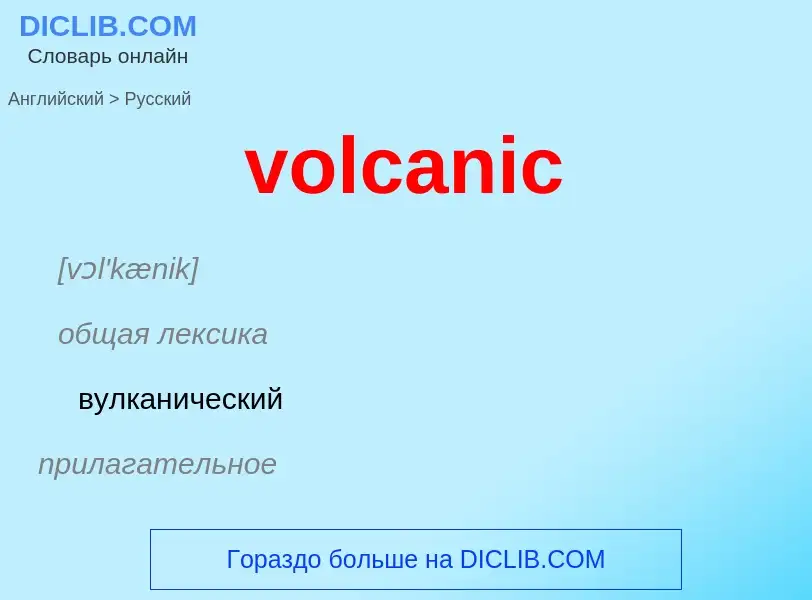ترجمة وتحليل الكلمات عن طريق الذكاء الاصطناعي ChatGPT
في هذه الصفحة يمكنك الحصول على تحليل مفصل لكلمة أو عبارة باستخدام أفضل تقنيات الذكاء الاصطناعي المتوفرة اليوم:
- كيف يتم استخدام الكلمة في اللغة
- تردد الكلمة
- ما إذا كانت الكلمة تستخدم في كثير من الأحيان في اللغة المنطوقة أو المكتوبة
- خيارات الترجمة إلى الروسية أو الإسبانية، على التوالي
- أمثلة على استخدام الكلمة (عدة عبارات مع الترجمة)
- أصل الكلمة
volcanic - ترجمة إلى الروسية
[vɔl'kænik]
общая лексика
вулканический
прилагательное
общая лексика
вулканический
вулканического происхождения
бурный
неистовый
вулканический (о страстях и т. п.)
неудержимый
сметающий всё на своём пути
легко взрывающийся
تعريف
ويكيبيديا

A volcano is a rupture in the crust of a planetary-mass object, such as Earth, that allows hot lava, volcanic ash, and gases to escape from a magma chamber below the surface.
On Earth, volcanoes are most often found where tectonic plates are diverging or converging, and most are found underwater. For example, a mid-ocean ridge, such as the Mid-Atlantic Ridge, has volcanoes caused by divergent tectonic plates whereas the Pacific Ring of Fire has volcanoes caused by convergent tectonic plates. Volcanoes can also form where there is stretching and thinning of the crust's plates, such as in the East African Rift and the Wells Gray-Clearwater volcanic field and Rio Grande rift in North America. Volcanism away from plate boundaries has been postulated to arise from upwelling diapirs from the core–mantle boundary, 3,000 kilometers (1,900 mi) deep in the Earth. This results in hotspot volcanism, of which the Hawaiian hotspot is an example. Volcanoes are usually not created where two tectonic plates slide past one another.
Large eruptions can affect atmospheric temperature as ash and droplets of sulfuric acid obscure the Sun and cool the Earth's troposphere. Historically, large volcanic eruptions have been followed by volcanic winters which have caused catastrophic famines.
Other planets besides Earth have volcanoes. For example, Mercury has pyroclastic deposits formed by explosive volcanic activity.


![The [[Stromboli]] stratovolcano off the coast of [[Sicily]] has erupted continuously for thousands of years, giving rise to its nickname "Lighthouse of the Mediterranean". The [[Stromboli]] stratovolcano off the coast of [[Sicily]] has erupted continuously for thousands of years, giving rise to its nickname "Lighthouse of the Mediterranean".](https://commons.wikimedia.org/wiki/Special:FilePath/Aerial image of Stromboli (view from the northeast).jpg?width=200)
![[[Capulin Volcano National Monument]] in New Mexico, US [[Capulin Volcano National Monument]] in New Mexico, US](https://commons.wikimedia.org/wiki/Special:FilePath/Capulin 1980 tde00005.jpg?width=200)
![Izalco volcano]], the youngest volcano in El Salvador. Izalco erupted almost continuously from 1770 (when it formed) to 1958, earning it the nickname of "Lighthouse of the Pacific". Izalco volcano]], the youngest volcano in El Salvador. Izalco erupted almost continuously from 1770 (when it formed) to 1958, earning it the nickname of "Lighthouse of the Pacific".](https://commons.wikimedia.org/wiki/Special:FilePath/Izalco Volcano.jpg?width=200)
![[[Koryaksky]] volcano towering over [[Petropavlovsk-Kamchatsky]] on [[Kamchatka Peninsula]], Far Eastern [[Russia]] [[Koryaksky]] volcano towering over [[Petropavlovsk-Kamchatsky]] on [[Kamchatka Peninsula]], Far Eastern [[Russia]]](https://commons.wikimedia.org/wiki/Special:FilePath/Koryaksky volcano Petropavlovsk-Kamchatsky oct-2005.jpg?width=200)
![major world climate alteration of 1783–84]], has a chain of volcanic cones along its length. major world climate alteration of 1783–84]], has a chain of volcanic cones along its length.](https://commons.wikimedia.org/wiki/Special:FilePath/Lakagigar Iceland 2004-07-01.jpg?width=200)
![VEI 7 and 8]]) with major historical volcanic eruptions in the 19th and 20th century. From left to right: Yellowstone 2.1 Ma, Yellowstone 1.3 Ma, Long Valley 6.26 Ma, Yellowstone 0.64 Ma . 19th century eruptions: Tambora 1815, [[Krakatoa]] 1883. 20th century eruptions: Novarupta 1912, St. Helens 1980, Pinatubo 1991. VEI 7 and 8]]) with major historical volcanic eruptions in the 19th and 20th century. From left to right: Yellowstone 2.1 Ma, Yellowstone 1.3 Ma, Long Valley 6.26 Ma, Yellowstone 0.64 Ma . 19th century eruptions: Tambora 1815, [[Krakatoa]] 1883. 20th century eruptions: Novarupta 1912, St. Helens 1980, Pinatubo 1991.](https://commons.wikimedia.org/wiki/Special:FilePath/Large eruptions.jpg?width=200)

![[[Narcondam Island]], India, is classified as a dormant volcano by the [[Geological Survey of India]]. [[Narcondam Island]], India, is classified as a dormant volcano by the [[Geological Survey of India]].](https://commons.wikimedia.org/wiki/Special:FilePath/Narcondam island.jpg?width=200)
![[[Olympus Mons]] ([[Latin]], "Mount Olympus"), located on the [[planet]] [[Mars]], is the tallest known mountain in the [[Solar System]]. [[Olympus Mons]] ([[Latin]], "Mount Olympus"), located on the [[planet]] [[Mars]], is the tallest known mountain in the [[Solar System]].](https://commons.wikimedia.org/wiki/Special:FilePath/Olympus Mons.jpeg?width=200)
![[[Fresco]] with [[Mount Vesuvius]] behind [[Bacchus]] and [[Agathodaemon]], as seen in [[Pompeii]]'s [[House of the Centenary]] [[Fresco]] with [[Mount Vesuvius]] behind [[Bacchus]] and [[Agathodaemon]], as seen in [[Pompeii]]'s [[House of the Centenary]]](https://commons.wikimedia.org/wiki/Special:FilePath/Pompeii - Casa del Centenario - MAN.jpg?width=200)
![[[Mount Rinjani]] eruption in 1994, in [[Lombok]], [[Indonesia]] [[Mount Rinjani]] eruption in 1994, in [[Lombok]], [[Indonesia]]](https://commons.wikimedia.org/wiki/Special:FilePath/Rinjani 1994.jpg?width=200)
![Sierra Negra Volcano]], [[Galapagos Islands]], during an eruption in October 2005 Sierra Negra Volcano]], [[Galapagos Islands]], during an eruption in October 2005](https://commons.wikimedia.org/wiki/Special:FilePath/SO2 Galapagos 20051101.jpg?width=200)
![[[Skjaldbreiður]], a shield volcano whose name means "broad shield" [[Skjaldbreiður]], a shield volcano whose name means "broad shield"](https://commons.wikimedia.org/wiki/Special:FilePath/Skjaldbreidur Herbst 2004.jpg?width=200)

![Light-microscope image of tuff as seen in [[thin section]] (long dimension is several mm): the curved shapes of altered glass shards (ash fragments) are well preserved, although the glass is partly altered. The shapes were formed around bubbles of expanding, water-rich gas. Light-microscope image of tuff as seen in [[thin section]] (long dimension is several mm): the curved shapes of altered glass shards (ash fragments) are well preserved, although the glass is partly altered. The shapes were formed around bubbles of expanding, water-rich gas.](https://commons.wikimedia.org/wiki/Special:FilePath/Tuff shards.jpg?width=200)
![Io]]. Io]].](https://commons.wikimedia.org/wiki/Special:FilePath/Tvashtarvideo.gif?width=200)
